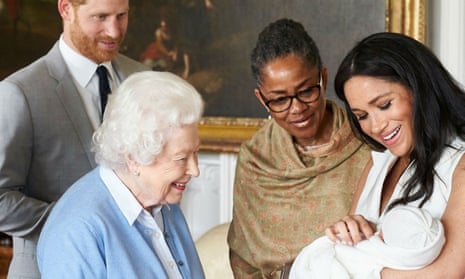The decision by the Duke and Duchess of Sussex to call their son Archie Harrison Mountbatten-Windsor came as a surprise to many.
The forenames are far from traditional for the royal family, which may be exactly why the couple, anxious for their son to have as normal an upbringing as possible, chose them. While there are courtesy titles they could have used, such as the Earl of Dumbarton, they have chosen not to do so for now, according to palace sources.
The name Archie – a shortened version of Archibald, which is of German origin and means “genuine”, “bold” and “brave” – has become increasingly popular. According to the Office for National Statistics, it was the 18th most popular in the UK in 2017, while Harrison came in at 34th.
The name is probably most familiar to Americans as that of the red-haired lead character in Archie Comics, which have been on US news stands for years and inspired the recent spinoff TV series Riverdale.
The TV historian Prof Kate Williams speculated that the choice of Archie may have been inspired by figures such as the South African intellectual and anthropologist Archie Mafeje, the R&B singer Archie Bell or the saxophonist Archie Shepp. “And Harrison, of course, means ‘son of Harry’, which is very sweet,” she tweeted.
Archie was never the bookmakers’ favourite. Alex Apati, of Ladbrokes, said just £100 was staked on the name.
It could be a popular choice with the baby’s cousin Prince George, however. The five-year-old son of the Duke and Duchess of Cambridge was said to have told a dog walker his name was Archie while out with his grandmother Carole Middleton, Hello magazine reported in January, leading to speculation it might be a nickname.
Mountbatten-Windsor has only been the family name of the royals since the 60s. It is a legacy of the Duke of Edinburgh’s deep-rooted desire for his descendants to bear his family name, and a decision made in the face of anti-German sentiment during the first world war.
For a newly married Prince Philip, passing his name on was a matter of great importance, and it brought him and the Queen into conflict with Winston Churchill’s government.
Born Prince Philip of Greece, on his British naturalisation he adopted the surname of his ambitious uncle Louis Mountbatten, who believed it would endear his foreign-sounding nephew to the British nation. Mountbatten itself was an anglicised version of the German Battenberg, Philip’s mother’s family name.
The Queen, meanwhile, was a Windsor. Her grandfather, George V, had changed the family name from Saxe-Coburg and Gotha to the bland, more acceptable sounding Windsor, after the castle.
When the Queen took the throne, the question of what the royal family and its descendants should be called taxed the finest brains. Churchill’s cabinet put pressure on the Queen to ignore Philip’s paternity amid frenzied speculation that their first-born, Charles, would become the first king in the House of Mountbatten. An angered Philip complained to friends: “Am I the only man in the country not allowed to give his name to his children?”
Sympathetic to her husband, the Queen found herself caught in the crossfire. She was initially persuaded to give her formal approval to a proclamation in April 1952 that she and her descendants “should continue to bear the family name of Windsor”.
It was not until 1960, and the imminent birth of her third child, Prince Andrew, that the Queen told a meeting of the privy council that she had decided her descendants – other than her children, or those entitled to use the HRH style, or the descendants of female family members who marry – would bear the surname Mountbatten-Windsor.








